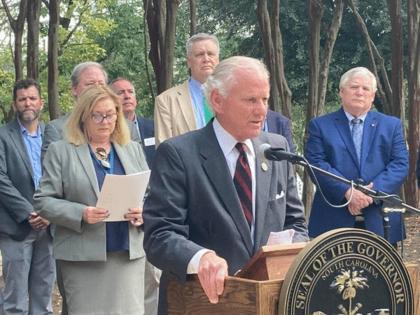Governor launches effort to protect rivers, water supplies as growth booms in SC
Published in News & Features
Gov. Henry McMaster took steps Tuesday to jump start plans for protecting South Carolina rivers and groundwater, forming a commission to study how to manage the water supplies that often spark disputes among businesses, farmers, environmentalists and others.
The commission, to be called WaterSC and composed of 30 members, will issue a report to the S.C. Legislature on the status of the state’s rivers and lakes and recommend changes to state laws by Feb. 1 of next year. The commission, or working group, will also update the state’s water plan, a more than 20 year old document that is supposed to guide the state’s oversight of rivers, lakes and groundwater.
That plan was last updated in 2004, state officials say. The new commission will help the state Department of Environmental Services update the water plan by Dec. 31, 2025, the governor said.
“South Carolina has been richly blessed with abundant water resources, but with increased demand driven by historic economic development and a booming population, we must take action now to ensure these resources are managed in the best interests of all South Carolinians,” McMaster said in a statement. “The formation of WaterSC will unite South Carolina’s top minds and key stakeholders to craft a plan that balances our economic and environmental interests, which will ensure that our water resources are plentiful and that our economy remains strong for generations to come.”
McMaster made the announcement at a news conference at a popular park on the Congaree River, flanked by state regulators, water resources officials and business interests. The initiative is focused on the use and protection of water supplies, rather than on pollution, although officials said protecting rivers from overuse also preserves their quality.
Water is important to provide power in a state with growing energy needs for industry, but rivers are also important as natural resources, McMaster said.
“We are going to carefully measure what we need, what we have, what we will have ... and how we are going to get it,’’ the governor said.
The governor’s push for a new water planning committee is the latest effort to prepare for residential and industrial growth, while protecting rivers that people rely on for recreation and drinking. Through the years, the state has had multiple water study committees, including a series of river basin councils that examine issues in specific areas of the state.
Myra Reece, who heads Environmental Services, said the new committee will rely on past efforts to come up with its assessment and recommendations.
“We know so much more today than we knew two years ago or even a year ago,’’ she said. “We’re going to .... take advantage of the expertise we had.’’
McMaster’s decision to form a water study commission is among other initiatives to assess issues that affect businesses, the public and the environment in South Carolina. McMaster previously formed a floodwater commission that recommended ways to address the fallout from high tides and heavy rains. The Legislature also has a study committee on the state’s future energy needs, as well as a water committee.
Clay Duffie, the former general manager of Mount Pleasant’s water utility, said he’s encouraged by McMaster’s efforts to address water issues. In recent years, Mount Pleasant has faced threats to its groundwater supply from a data center that located in South Carolina.
“We’ve been supporting good planning,’’ Duffie said, noting that McMaster’s effort “is going to finally push this over the goal line.’’
McMaster’s announcement drew a crowd of about 30 to the amphitheater in West Columbia.
Among those in attendance were representatives of environmental groups, such as Upstate Forever, and industry associations that need water. S.C. Farm Bureau President Harry Ott and Forestry Association chief Cam Crawford stood behind McMaster during the announcement that he would sign an executive order creating the planning committee.
McMaster said the commission will be composed of an array of interests that include environmentalists, natural resource managers and others, in addition to business and farm representatives.
South Carolina, like other Sun Belt states, is feeling the impact of growth and that has put a strain on its water supplies at times. From 1990 to 2018, population in South Carolina rose from 3.5 million to 5.1 million, according to the Department of Environmental Services. It could approach 5.8 million people by 2030.
In the Edisto River Basin, megafarms have sucked up billions of gallons of water from the river and the ground to irrigate thirsty crops. Groundwater levels have dropped in some places.
The issue has become enough of a concern that the U.S. Environmental Protection Agency has told South Carolina to improve parts of its surface water withdrawal law.. The federal agency said South Carolina’s water law is not scientifically sound, doesn’t preserve fish and wildlife, and actually allows overuse of rivers, The State has previously reported.
At the same time, new housing projects and industrial plants are increasingly demanding more water. Data centers that have come into the state require large amounts of water to cool them off, raising questions about impacts on groundwater.
The Department of Environmental Services says the state has more than 11,000 miles of flowing streams, which drain 30 billion gallons per day to the ocean through four major river basins.
©2024 The State. Visit thestate.com. Distributed by Tribune Content Agency, LLC. ©2024 The State. Visit at thestate.com. Distributed by Tribune Content Agency, LLC.










Comments